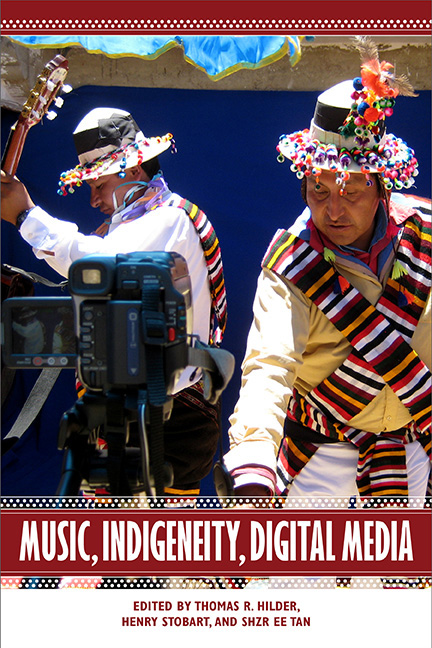Book contents
- Frontmatter
- Dedication
- Contents
- List of Illustrations
- Acknowledgments
- Music, Indigeneity, Digital Media: An Introduction
- 1 Taiwan's Aboriginal Music on the Internet
- 2 Recording Technology, Traditioning, and Urban American Indian Powwow Performance
- 3 YouTubing the “Other”: Lima's Upper Classes and Andean Imaginaries
- 4 An Interview with Russell Wallace
- 5 Mixing It Up: A Comparative Approach to Sámi Audio Production
- 6 Creative Pragmatism: Competency and Aesthetics in Bolivian Indigenous Music Video (VCD) Production
- 7 Keepsakes and Surrogates: Hijacking Music Technology at Wadeye (Northwest Australia)
- 8 The Politics of Virtuality: Sámi Cultural Simulation through Digital Musical Media
- Selected Bibliography
- List of Contributors
- Index
Music, Indigeneity, Digital Media: An Introduction
Published online by Cambridge University Press: 26 April 2018
- Frontmatter
- Dedication
- Contents
- List of Illustrations
- Acknowledgments
- Music, Indigeneity, Digital Media: An Introduction
- 1 Taiwan's Aboriginal Music on the Internet
- 2 Recording Technology, Traditioning, and Urban American Indian Powwow Performance
- 3 YouTubing the “Other”: Lima's Upper Classes and Andean Imaginaries
- 4 An Interview with Russell Wallace
- 5 Mixing It Up: A Comparative Approach to Sámi Audio Production
- 6 Creative Pragmatism: Competency and Aesthetics in Bolivian Indigenous Music Video (VCD) Production
- 7 Keepsakes and Surrogates: Hijacking Music Technology at Wadeye (Northwest Australia)
- 8 The Politics of Virtuality: Sámi Cultural Simulation through Digital Musical Media
- Selected Bibliography
- List of Contributors
- Index
Summary
This book is about Indigenous musical performance in a digital era. It addresses both the impact of digital technologies on the composition, production, and consumption of music by and for Indigenous people and the ways in which Indigenous people have utilized digital technologies to revive, repatriate, and transmit musical traditions in complex articulations of Indigeneity. Bringing together the work of international scholars and musicians, this volume highlights new perspectives on contemporary Indigenous music making across five continents to reveal both striking connections and contrasts across Indigenous experiences. Indigenous communities have faced histories of genocide, coerced religious conversion, social marginalization, land dispossession, and cultural assimilation. Since World War II, Indigenous activists, academics, and artists have mobilized transnationally to achieve political recognition in diverse governmental and nongovernmental institutions, develop international laws that secure Indigenous rights, and fight for rights to land and cultural heritage. The revival of Indigenous languages, cosmologies, and cultural traditions, including music, has assisted aspirations to Indigenous political and cultural self-determination. Communication technologies have long been tools for nation building and imperial expansion, as well as symbols of the supposed ascendancy of the industrialized “West.” The explosion of digital technologies over the last decades has also very much shaped the everyday lives of Indigenous people but in ways that complicate earlier hegemonic power structures. As Pamela Wilson and Michelle Stewart write, “Contemporary Indigenous media demonstrate the extent to which the hallmarks of an earlier regime of empire—colonization, forced assimilation, genocide, and diaspora—are being challenged and displaced by new constellations of global power.” Indeed, digital communication technologies have themselves transformed forms of Indigenous activism while also being adopted by Indigenous musicians to assist in cultural revival, repatriation, and transmission—processes which have helped to “decolonize” earlier media spaces and practices. In turn, those technologies have shaped musical traditions, alongside notions of Indigenous subjectivity, collectivity, and sovereignty. But digital media might also cement hegemonies through censorship, surveillance, and propaganda and magnify existing hierarchies within and between Indigenous communities along lines of gender, class, and “race.”
- Type
- Chapter
- Information
- Music, Indigeneity, Digital Media , pp. 1 - 27Publisher: Boydell & BrewerPrint publication year: 2017

